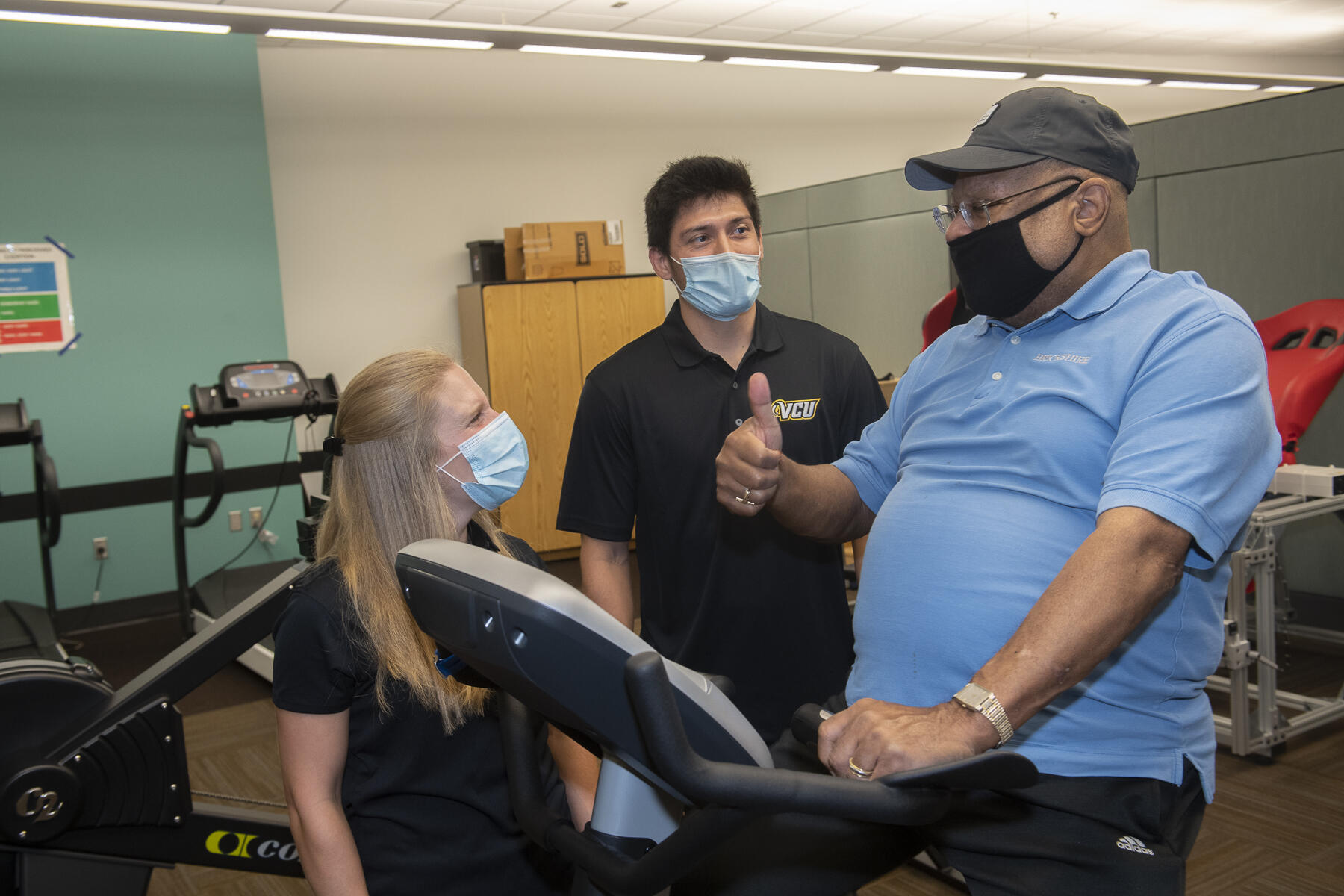
Sept. 21, 2021
For Richmond residents with kidney disease, a new program offers free exercise rehabilitation
Share this story
John R. Smith had just finished a stationary bike cardio session in a Virginia Commonwealth University exercise intervention lab — monitored and encouraged by rehabilitation and movement science doctoral students Natalie Bohmke and Nico Chavez — and it was now time for a few sets of weightlifting.
“All right Mr. Smith, what’s your favorite activity for today?” Chavez asked. “Bicep curls, shoulder press, chest press? What do you think?”
“Let’s do biceps,” said Smith, a New Kent resident and retired New Jersey utility executive, grabbing a couple of dumbbells.
“[Bohmke and Chavez] don’t play around — they’re tough!” Smith said. “But they have been so, so helpful to me. It takes a team effort, and they’re the A-team.”
Smith is one of nine Richmond-area residents so far who have been referred to a newly launched program of VCU’s Department of Kinesiology and Health Sciences in the College of Humanities and Sciences that provides chronic kidney disease and renal transplant patients with free exercise rehabilitation, as well as nutrition counseling and lifestyle behavior change support.
The program, called Renal Rehab, aims to integrate regular physical activity and exercise into routine care for patients across the spectrum of chronic kidney disease, which affects more than 1 in 7 adults, or 15% of the U.S. population.
“For patients with chronic kidney disease, a lot of research has found that exercise is beneficial for a myriad of health outcomes, including physical and mental health,” said Danielle Kirkman, Ph.D., an assistant professor in the Department of Kinesiology and Health Sciences and director of Renal Rehab. “But while there’s a lot of evidence to support that, we still don’t see exercise rehabilitation implemented as part of routine care for kidney disease.”

Renal Rehab launched earlier this year, she said, to help fill that gap for the Richmond community. It helps patients referred by VCU Health clinicians to start a physical activity and lifestyle program safely in an environment that is not intimidating, and supported by rehabilitation and movement science Ph.D. students like Bohmke and Chavez, as well as master’s degree students and undergraduate interns.
“I love this stuff,” Chavez said. “Out of everything that we do, all the research, all the different projects we're involved in, this is by far my favorite, mostly because of the relationships and connections you make with people.
“A lot of the patients with kidney disease might not have a lot of experience with exercise, and especially with their condition it's pretty intimidating to go to any random gym, walk in and see all these people that are super fit. Many patients may walk in there and say, ‘You know what? I don’t belong here,’” he said. “So it's just awesome to give them a place to come and work out and have someone to encourage them and help them learn how to exercise safely based on their medical conditions.”
One of the best parts, Bohmke said, is seeing the participants’ progress.
“It’s very rewarding seeing the improvements that Mr. Smith and other patients have made over the course of the program,” she said. “It’s just incredible to see. You see them gain confidence and strength, but we also do laboratory testing and we are seeing that these patients are managing their diabetes better and improving cholesterol levels through exercise.”
“Out of everything that we do, all the research, all the different projects we’re involved in, this is by far my favorite, mostly because of the relationships and connections you make with people.”
Nico Chavez
The program takes a multidisciplinary approach to improve patient health and outcomes, Kirkman said. Salvatore Carbone, Ph.D., an assistant professor in the Department of Kinesiology and Health Sciences, leads nutrition counseling, while Alexander Lucas, Ph.D., an instructor with VCU Pauley Heart Center and the Department of Health Behavior and Policy in the School of Medicine, leads lifestyle counseling. VCU Health partners include Jason M. Kidd, M.D., an associate professor in the Department of Internal Medicine, and Gaurav Gupta, M.D., an associate professor and transplant nephrologist in the Department of Internal Medicine.
In addition to helping the patients, the program also provides VCU students with an opportunity to gain firsthand experience in learning about kidney disease and helping people from the community.
Research is also part of the program. Participants can opt-in to have routine physiological and quality-of-life assessments throughout the program. That data could help address unanswered research questions at the forefront of the field of physical activity, cardiovascular and renal health, Kirkman said.
“Our program integrates the three pillars of higher education: community engagement, teaching and learning, and research,” she said.
Smith is waiting for a kidney transplant. His doctors referred him to the program, telling him it would be good preparation ahead of a transplant. Since starting the program, Smith said he feels stronger, healthier and more mobile.
“When I first came here, I used a walker. And, as they could probably tell you, I wasn't that great at the exercises,” he said. “Since then, it has helped me out a great deal. I no longer need my walker — I can now walk with just a cane.”
For Smith, the program has benefited his health as well as his confidence. He said he would recommend it to other potential kidney transplant patients.
“When you get through this, this is really uplifting to me,” he said. “Because after you go through the exercises, you feel much better. I feel like I can take on an operation or just about anything else.”
Subscribe to VCU News
Subscribe to VCU News at newsletter.vcu.edu and receive a selection of stories, videos, photos, news clips and event listings in your inbox.



